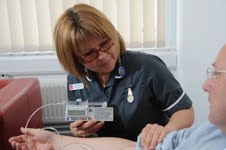Brighton lecturer starts two-year research project with heart patients
A Brighton University lecturer is carrying out research that could lead to many more heart patients being treated at home.
Chris Watson, a senior lecturer at Brighton, is working on one of 12 pilot projects which are being funded by the British Heart Foundation.
The project is testing the safety and effectiveness of giving intravenous medication to heart patients in their own homes rather than in hospital.
The approach has the potential to save the National Health Service millions of pounds and could improve patients’ quality of life.
Chris Watson, who teaches at the university’s School of Nursing and Midwifery, also works as a nurse for East Sussex Healthcare NHS Trust.
She said: “Patients with heart failure often ‘fill up’ with fluid and can spend 10 to 14 days in hospital while they are given diuretic medication intravenously to encourage the body to drain the fluid naturally.”
Some 700,000 people in Britain have suffered from heart failure. Those patients account for 5 per cent of all emergency medical admissions and cost 2 per cent of the NHS budget.
When heart failure nurses treated patients in their homes as part of an earlier year-long trial, hospital admissions were reduced by 43 per cent.
The project, also funded by the British Heart Foundation, saved the NHS more than £800,000 over the year.
Chris Watson said that the benefits were not just financial: “Providing diuretic medication intravenously in patients’ own homes is so much nicer and less stressful than doing so in hospital.
“It improves patients’ quality of life by reducing some of the distressing symptoms of heart failure.”
She said that the pilot project would take place in Hastings and Rother and would run for two years.
She added: “This is a cutting-edge scheme which follows the national agenda for hospital avoidance and the transfer of care into the community.”
A consultant at the Conquest Hospital in Hastings, Dr Hugh McIntyre, devised the national protocol and is the clinical lead for the research.





















